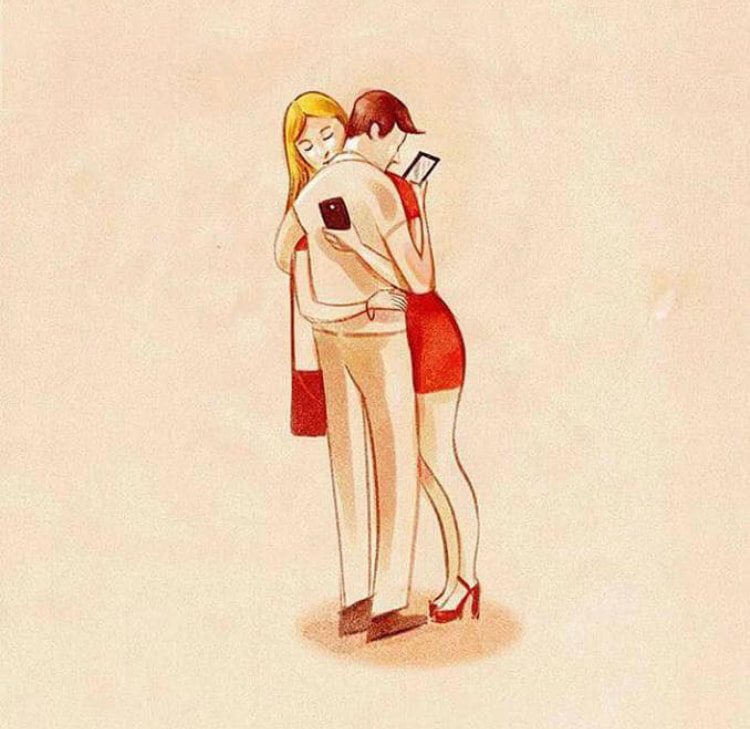|
Modern life is greatly impacted by the proliferation of technology. Across the world, more and more people are using technology both at work and at home. In a report by the Pew Internet and American Life Project called “Networked Families,” “96% of employed Americans use the internet, email, or a cellphone in ‘some way’” (Greenwood 1). Another study conducted by the same researchers points out the prevalence of technology in the household. The alarming rate at which technology is becoming more prevalent should raise concerns about how modern life will be affected. While humans may be able to connect over long distances, face-to-face connection can be completely ignored. Technology may allow for some level of connections between humans, such as social media or FaceTime with friends and family. However, technology does not provide an effective medium for people to form meaningful connections because it overwhelms humans, allows for avoidance of social interaction, and creates ethical issues involving human relationships. Technology overwhelms humans, causing people to miss social opportunities. Well-published author Chuck Klosterman compares the influx of work caused by technology to zombies. He says, “Zombie killing is philosophically similar to reading and deleting 400 work e-mails on a Monday morning or filling out paperwork that only generates more paperwork, or following Twitter gossip out of obligation, or performing tedious tasks in which the only true risk is being consumed by the avalanche” (Klosterman 20). Because of the ceaseless stimulus, people do not have the time to be able to form meaningful connections with others. Any kind of activity, including maintaining connections, requires energy that is obtained by sleeping at night. Technology can inhibit peoples’ ability to be able to get this energy. According to Jocelyne Matar Boumosleh of the Notre Dame University, a study including 688 students found that, “prevalence rates of smartphone-related compulsive behavior, functional impairment, tolerance and withdrawal symptoms were substantial. 35.9% felt tired during daytime due to late-night smartphone use, 38.1% acknowledged decreased sleep quality, and 35.8% slept less than four hours due to smartphone use more than once” (Boumosleh 1). Often, school work is associated with students losing sleep, causing students the next day to just go through the motions, however the culprit might actually be technology. Because of technology, humans can become tired and unable to sustain meaningful connections because they do not have the energy to do so anymore. Not only does technology overwhelm humans with work, technology also allows for the avoidance of social interactions. Instead of forming meaningful connections with other humans, one can stare at their screen even when surrounded by dozens of people. According to Jake, a high school student suffering from anxiety profiled by the New York times, technology “was a way for [him] not to think about classes and college, not have to talk to people” (Denizet-Lewis 8). Photographer Eric Pickersgill further builds upon the isolating power of technology through his series of photos called “Removed.” He took pictures of people using phones and edited out the phones, creating powerful emotions, such as sadness, in the viewers. In the pictures, there are multiple people who are staring down at their devices while being with others. As Steve Mollman, a journalist of the Quartz and recipient of multiple publishing rewards, notes that people are “often ignoring beautiful surroundings or opportunities for human connection” (Pickersgill 36). Increasingly, humans are getting caught up in their digital life, ignoring the potential to grow meaningful connections in person, causing a negative effect on human relations. The effect of cell phones on relationships is well known. However, some effects of technology may not be so obvious. Due to the growth in technology, some jobs may be replaced by AI. This can affect the people who lose their jobs not only financially, but also socially. Mr. Kim, an AI ethicist, says when his dad retired from his job as a noodle factory worker, “He got money, but he lost community and self-respect” (Miller 24). Without a job, Mr. Kim’s father is unable to sustain meaningful connections with his community as a whole, as he is now isolated from society. This can happen in increasing frequency due to the proliferation of technology in modern society, harming meaningful connections between an individual and their community. With the proliferation of technology, ethical discussions involving human and AI relationships have become increasingly more common. Some argue that AI can make people falsely believe that they are having legitimate relationships. A study involving language and social interaction in autistic children discovered that they respond better to an AI instead of an actual person. This may seem positive, until one looks at the potential dangers this can pose. John W. Miller cites Professor of Philosophy Alexis Elder who argues, “The hazard involves these robots’ potential to present the appearance of friendship to a population who cannot tell the difference between real and fake friends” (Miller 26). Would this connection be genuine if one party, the AI, does not actually have human emotions? The AI cannot genuinely reciprocate human emotions toward someone, making the connection one-sided and disingenuous. This predicament is not only occurring with friendships, but also with romance. Sex robots are a recent game changer for the dynamics of human romantic relationships. This technology is advertised to people lacking romantic connections. As John W. Miller, a writer for America, observes, “Makers of new lines of artificial intelligence dolls costing over $10,000 each claim, as one ad says, to ‘deliver the most enjoyable conversation and interaction you can have with a machine’” (Miller 26). Technology can inhibit people from making real connections with other humans as there is no need to if their perfect match at home catering to their every need. While technology may not be an effective medium for human connection, there are some benefits it can provide. Both families and work members can be more connected through technology. With emails and texting, co-workers can better communicate and efficiently work toward a common goal. At home, technology can be used by families to bond, such as watching a movie on Netflix together. Even video games, an infamously debated topic, can bring people around the world together to form meaningful relationships. Gamers can gather in a convention, such as the upcoming PAX West convention. Greg Miller, founder of pop culture internet channel, argues that video games allow for fellow gamers, including those with disabilities, to bond over their shared passion (Miller 3). Video games provide a common ground for human connection between all kinds of people, including those with disabilities. In multiple types of situations, technology can be a helpful tool in order to maintain and grow significant relationships. The impact of technology cannot be restricted to either being “good” or “bad.” Technology can allow for and prohibit people to form meaningful connections. Thousands across the world can connect with each other through a simple click on a screen. However, the potential consequences of technology outweigh the benefits. Many can disconnect from people in real life, opting to go on social media instead of spending time with people in real life. Humans can make superficial connections with robots whilst neglecting real connections with others. Therefore, it is best for people to turn off their screens, to go out and discover the vast world that is waiting for them. It might not be easy to cut down on screen time, but the potential meaningful connections are priceless. Sources: Boumosleh, Jocelyne Matar. “Depression, anxiety, and smartphone addiction in university students- A cross sectional study.” Denizet-Lewis, Benoit. “Why Are More American Teenagers Than Ever Suffering From Severe Anxiety?” The New York Times Magazine, 11 Oct. 2017, www.nytimes.com/2017/10/11/magazine/why-are-more-american-teenager-than-ever- Suffering-from-severe-anxiety.html. Greenwood, Bill. “Pew reports target networked families and workers.” Information Today, Jan. 2009, ph. 35. Gale OneFile: Business. Klosterman, Chuck. “My Zombie, Myself: Why Modern Life Feels Rather Undead.” New York Times, 5 Dec. 2010, p. 1(L). Gale In Context: Opposing Viewpoints. Miller, Greg. “Dear President Trump: Video Games Are So More Than Violent.” Newsweek, 17 Aug. 2019. Miller, John W. “THE CREEPING ETHICAL CHALLENGES OF ARTIFICIAL INTELLIGENCE: Technology is already bending our perception of the world around us.” America, 12 Nov. 2018, p. 20+. Gale One File Religion and Philosophy. Pickersgill, Eric. “Removed.” The Atlantic, 2015.
0 Comments
Your comment will be posted after it is approved.
Leave a Reply. |
WHS StudentsThe Journal of Scholarship at WHS is a peer reviewed journal publishing academic works by emerging scholars at Weymouth Middle and High School. Archives
May 2024
Categories
All
|


 RSS Feed
RSS Feed
